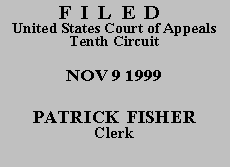

| UNITED STATES OF AMERICA,
Plaintiff-Appellee, v. ERNEST L.C. ROBISON, |
|
In January 1996, officers set up surveillance at the Denver airport after receiving information from reliable informants that Robison would be returning from California carrying cocaine. Robison was carrying a shoulder bag when he got off the airplane in Denver. Officers Clyde Langley and Robert Vescio approached Robison, identified themselves, and told Robison that they had information he was transporting drugs. Robison consented to a search of his person, but refused to consent to a search of his bag. Langley found no drugs on Robison's person.
Langley took custody of Robison's bag, told Robison to contact him in "a day or so" to retrieve the bag, and allowed Robison to leave the airport. Less than ten minutes later, Langley took the bag for a canine sniff and the dog alerted to the bag. Langley obtained a search warrant for the bag. The search revealed 889.8 grams of cocaine base. The district court denied the motion to suppress the evidence obtained from the search, finding the officers had a reasonable suspicion to detain Robison.
When reviewing a district court's denial of a motion to suppress, we accept its factual findings unless they are clearly erroneous, viewing the evidence in the light most favorable to the government. United States v. Hargus, 128 F.3d 1358, 1361 (10th Cir. 1997), cert. denied, 118 S. Ct. 1526 (1998). We review de novo the ultimate determination of reasonableness under the Fourth Amendment, considering the totality of the circumstances. Id.
Robison does not challenge the legality of the initial investigatory stop in the airport, but argues the detention of his carry-on bag after the initial investigation was unreasonable. The officers could briefly detain the bag if their observations led them to reasonably suspect Robison was carrying drugs in the bag and the detention was properly limited in scope. See United States v. Place, 462 U.S. 696, 708-09 (1983); United States v. Brown, 24 F.3d 1223, 1226 (10th Cir. 1994).
We consider the totality of the circumstances to determine whether a reasonable suspicion existed. See United States v. Houston, 21 F.3d 1035, 1038 (10th Cir. 1994). The officers had information from reliable sources that Robison would arrive at the Denver airport carrying drugs. They stopped Robison in the airport with a carry-on bag. After a search of Robison's person revealed no drugs, the officers' reasonable suspicion that he had drugs in the bag would not disappear but would likely increase. The officers had a reasonable suspicion that Robison had drugs in his bag.
Even with a reasonable suspicion of criminal activity, the detention also must have been reasonable in scope and duration. United States v. Scales, 903 F.2d 765, 769 (10th Cir. 1990). Two factors are relevant to determining whether the officers' conduct exceeded the permissible duration of an investigative detention: (1) the brevity of the invasion of Robison's Fourth Amendment interests, and (2) how diligently the officers pursued their investigation. See id. (citing Place, 462 U.S. at 709). The invasion of Robison's Fourth Amendment interest was minimal. Although he was dispossessed of his bag, he had arrived at his destination, he was not forced to alter his itinerary, and he was allowed to leave the airport. See United States v. Bell, 892 F.2d 959, 968 (10th Cir. 1989) (finding that although the suspect was at the airport, he was not traveling, so seizure of the package did not intrude on his travel plans). The testimony showed the officers diligently pursued their investigation. The actual detention of Robison's bag lasted only ten minutes, until the drug dog alerted to the bag and probable cause attached. The detention of Robison's bag was supported by reasonable suspicion and was properly limited in duration. The district court did not err in denying Robison's motion to suppress.
AFFIRMED.
Entered for the Court
Mary Beck Briscoe
Circuit Judge
*. This order and judgment is not binding precedent, except under the doctrines of law of the case, res judicata, and collateral estoppel. The court generally disfavors the citation of orders and judgments; nevertheless, an order and judgment may be cited under the terms and conditions of 10th Cir. R. 36.3.
1. Honorable Sam A. Crow, Senior District Judge, of the United States District Court for the District of Kansas, sitting by designation.